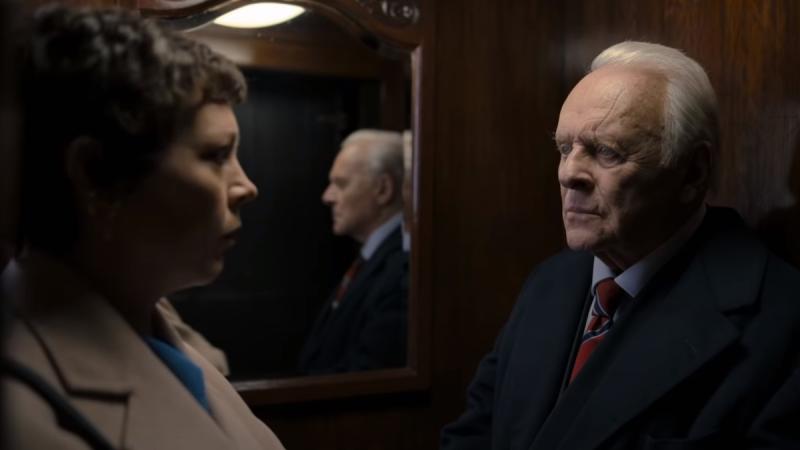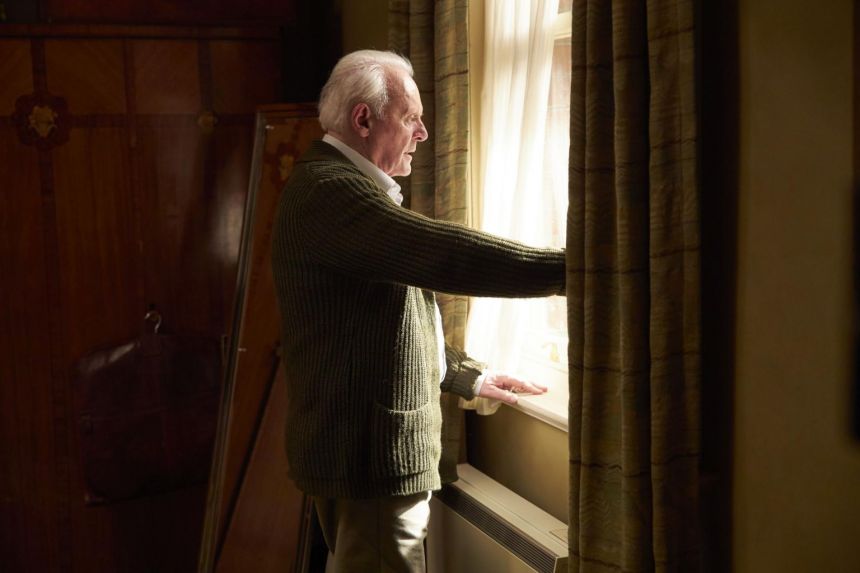The Father review - gripping dementia drama | reviews, news & interviews
The Father review - gripping dementia drama
The Father review - gripping dementia drama
Anthony Hopkins and Olivia Colman star in Florian Zeller's Oscar-winning film adaptation

Florian Zeller: the name might not be familiar in the world of cinema. But watch this space.
We first see Anne (Olivia Colman) hurrying to the grand London mansion flat of her father, Anthony (Anthony Hopkins). In the spacious, decorated rooms there is a disarming tension because Anthony, in denial about his condition, has driven away another carer, claims that he needs no help, and punishes Anne for trying to offer more. The drama subsides and Anthony and Anne drift apart. When we think a resolution has settled, Anthony becomes alarmed. There is a man in his living room that he doesn’t recognise. This man says that he owns the flat. This man says that he is Anne’s husband.
How do you portray the experience of dementia? It’s a brave endeavour fraught with sensitivities, in part because it is a logical impossibility. Perhaps because of this contradiction, Zeller has aimed for recognition rather than verisimilitude. We are placed into Anthony’s perspective of the world in order to feel something of what he might feel, rather than to be taught a fact. So, gradually, minor details build and take on uncanny significance. What we know suddenly changes. A detail we may have ignored reappears as a key piece in the plot's puzzle.
This is how Zeller has turned a family drama into a gripping thriller. Nothing is certain and every word or item could emerge later with decisive meaning. Once we realise the film's framework we are faced with a dilemma. It might be the dilemma of the dementia sufferer: look away and you'll forget. Lose attention and the world before you slips away.
 How easy it would be to flood a film like this with flamboyant trickery or showy pull-the-rug-out stunts. Zeller resists. His film is as much about the interior worlds of his characters as it is about the maze-world they shuffle through. The balance is met with grace. The gimmicky version of a script like this would not capture the breathless pre-grief of Colman’s performance, let alone the cavernous and knee-bending emotional power of Hopkins.
How easy it would be to flood a film like this with flamboyant trickery or showy pull-the-rug-out stunts. Zeller resists. His film is as much about the interior worlds of his characters as it is about the maze-world they shuffle through. The balance is met with grace. The gimmicky version of a script like this would not capture the breathless pre-grief of Colman’s performance, let alone the cavernous and knee-bending emotional power of Hopkins.
These lead performances have received all the attention, deservedly so, but Zeller’s directing remains underpraised. The poise of camerawork, the wielding of a single setting and the refrains of Ludovico Einaldi’s score might remind some Netflix-benumbed consumers of the excitement and drama that is possible through restraint, subtlety, patient observation and formal control. Zeller does far more than merely achieve on film those effects that could not be achieved on stage. He makes an original contribution to a movie genre that stretches from Hitchcock’s Rear Window to Haneke’s Amour.
But Zeller is no Hitchcock (at least not yet). And Amour will remain the greatest film about memory loss, or any other personal crisis, in recent memory. Yet The Father is a powerful debut. The mood of isolation with its warped sense of time and the distanced characters confined to their homes: this film reflects our present moment without labouring the point home or making the obvious analogies. After a year restricted to watching attention seeking streaming content, welcome back to the cinema. Welcome back to feeling. And watch this space. What will Zeller do next?
The future of Arts Journalism
You can stop theartsdesk.com closing!
We urgently need financing to survive. Our fundraising drive has thus far raised £49,000 but we need to reach £100,000 or we will be forced to close. Please contribute here: https://gofund.me/c3f6033d
And if you can forward this information to anyone who might assist, we’d be grateful.

Subscribe to theartsdesk.com
Thank you for continuing to read our work on theartsdesk.com. For unlimited access to every article in its entirety, including our archive of more than 15,000 pieces, we're asking for £5 per month or £40 per year. We feel it's a very good deal, and hope you do too.
To take a subscription now simply click here.
And if you're looking for that extra gift for a friend or family member, why not treat them to a theartsdesk.com gift subscription?
more Film
 After the Hunt review - muddled #MeToo provocation
Julia Roberts excels despite misfiring drama
After the Hunt review - muddled #MeToo provocation
Julia Roberts excels despite misfiring drama
 London Film Festival 2025 - Bradley Cooper channels John Bishop, the Boss goes to Nebraska, and a French pandemic
... not to mention Kristen Stewart's directing debut and a punchy prison drama
London Film Festival 2025 - Bradley Cooper channels John Bishop, the Boss goes to Nebraska, and a French pandemic
... not to mention Kristen Stewart's directing debut and a punchy prison drama
 Ballad of a Small Player review - Colin Farrell's all in as a gambler down on his luck
Conclave director Edward Berger swaps the Vatican for Asia's sin city
Ballad of a Small Player review - Colin Farrell's all in as a gambler down on his luck
Conclave director Edward Berger swaps the Vatican for Asia's sin city
 London Film Festival - from paranoia in Brazil and Iran, to light relief in New York and Tuscany
'Jay Kelly' disappoints, 'It Was Just an Accident' doesn't
London Film Festival - from paranoia in Brazil and Iran, to light relief in New York and Tuscany
'Jay Kelly' disappoints, 'It Was Just an Accident' doesn't
 Iron Ladies review - working-class heroines of the Miners' Strike
Documentary salutes the staunch women who fought Thatcher's pit closures
Iron Ladies review - working-class heroines of the Miners' Strike
Documentary salutes the staunch women who fought Thatcher's pit closures
 Blu-ray: The Man in the White Suit
Ealing Studios' prescient black comedy, as sharp as ever
Blu-ray: The Man in the White Suit
Ealing Studios' prescient black comedy, as sharp as ever
 The Woman in Cabin 10 review - Scandi noir meets Agatha Christie on a superyacht
Reason goes overboard on a seagoing mystery thriller
The Woman in Cabin 10 review - Scandi noir meets Agatha Christie on a superyacht
Reason goes overboard on a seagoing mystery thriller
 London Film Festival 2025 - crime, punishment, pop stars and shrinks
Daniel Craig investigates, Jodie Foster speaks French and Colin Farrell has a gambling habit
London Film Festival 2025 - crime, punishment, pop stars and shrinks
Daniel Craig investigates, Jodie Foster speaks French and Colin Farrell has a gambling habit
 I Swear review - taking stock of Tourette's
A sharp and moving tale of cuss-words and tics
I Swear review - taking stock of Tourette's
A sharp and moving tale of cuss-words and tics
 A House of Dynamite review - the final countdown
Kathryn Bigelow's cautionary tale sets the nuclear clock ticking again
A House of Dynamite review - the final countdown
Kathryn Bigelow's cautionary tale sets the nuclear clock ticking again
 theartsdesk Q&A: Idris Elba on playing a US President faced with a missile crisis in 'A House of Dynamite'
The star talks about Presidential decision-making when millions of lives are imperilled
theartsdesk Q&A: Idris Elba on playing a US President faced with a missile crisis in 'A House of Dynamite'
The star talks about Presidential decision-making when millions of lives are imperilled

Add comment